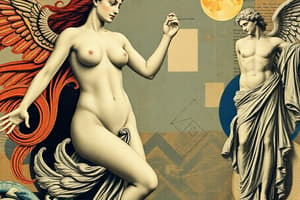Podcast
Questions and Answers
Who is the Greek Goddess of love and sexuality?
Who is the Greek Goddess of love and sexuality?
- Athena
- Demeter
- Aphrodite (correct)
- Artemis
Flashcards
Who was Aphrodite?
Who was Aphrodite?
Aphrodite was the Greek goddess of love, beauty, and desire, associated with fertility, pleasure, and eternal youth. She had immense power over love.
Study Notes
The Greek Goddess Aphrodite: Love, Sexuality, and Beyond
The Greek Goddess Aphrodite, also known as Venus in Roman mythology, was the goddess of love and beauty. She was one of the most popular and worshipped deities in ancient Greek religions. Aphrodite was associated with various aspects of love, desire, and sexuality, as well as fertility, pleasure, and eternal youth.
Aphrodite's Origin
Aphrodite's origins are closely tied to the creation story of the universe. According to legend, she was born from the sea foam that formed when Cronus, the Titan, castrated his father Uranus and threw his genitals into the sea. From this sea foam, Aphrodite emerged, becoming the goddess of love, beauty, and sexuality.
Aphrodite's Powers and Influence
Aphrodite held immense power over love and desire, with the ability to make anyone fall in love with her through her magic girdle. Her beauty was said to be so powerful that people would fight over her, causing chaos and conflicts. She was also known for her influence over relationships, both romantic and otherwise, and was often involved in the lives of gods and humans alike.
Aphrodite's Affair with Hephaestus
Despite being the goddess of love, Aphrodite had a less-than-ideal marriage with Hephaestus, the god of blacksmiths and volcanoes. Hephaestus was known for his ugliness and limp, and Aphrodite was attracted to other gods and mortals, leading to numerous affairs.
Aphrodite's Children
Aphrodite had several children with various gods and mortals. Her most famous son was Eros, the god of love and passion. Aphrodite's love affairs and children contributed to her status as the goddess of love and desire.
Aphrodite's Symbols
Aphrodite was often associated with symbols of love, beauty, and sexuality. Her most common symbols included doves, roses, and mirrors, which reflected her beauty, love, and vanity.
Aphrodite's Influence in Greek Mythology
Aphrodite was a central figure in many Greek myths and legends. She was involved in the Trojan War, causing the love triangle between Paris and Helen, which led to the war. Aphrodite was also a patron of love and marriage, and her influence could be seen in the many works of art inspired by her beauty.
In conclusion, Aphrodite, the Greek Goddess of love and beauty, was a significant and influential deity in ancient Greek religions. Her powers over love, desire, and sexuality, as well as her association with fertility, pleasure, and eternal youth, made her one of the most worshipped and revered figures in the Greek pantheon.
Studying That Suits You
Use AI to generate personalized quizzes and flashcards to suit your learning preferences.




